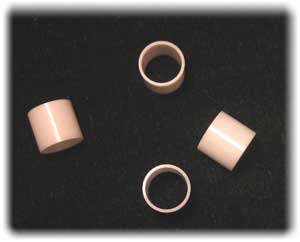|
|
|
|
|
|
|
|
|
 |
 |
 |
 |
|
|
|
|
|
|
|
|
Applications Thermal Insulator |
|
|
Zirconium OxideThermal Insulator
|
|
| ||||||||||||||||||
| Thermal insulator in a weight sensitive, power budget sensitive application.
APPLICATION HIGHLIGHTS: This application had extreme constraints on energy usage and weight. The most significant energy drain was in the heaters necessary to maintain the system at a constant temperature. Several low conductivity ceramics were tried. The energy budget could be met and the weight requirement was met but the materials were subject to mechanical failure. Accuratus offered zirconia as an alternative that would allow the designers to meet all design constraints. The low thermal conductivity of the zirconium oxide permitted the direct replacement in the design and still meet the energy usage requirements. The weight requirement was still met however, it was close to exceeding the allowable limit. Engineers at Accuratus pointed out to the designers that there was enough headroom in the mechanical properties of the ZrO2 to significantly reduce wall thicknesses. The modified design further reduced heat transfer due to the much smaller heat transfer area, actually weighed less than the original design and eliminated mechanical failures. Although somewhat counterintuitive, the higher density zirconia better met the weight constraints of the design because the much higher strength of the zirconium oxide allowed much smaller components to be used while not sacrificing the necessary mechanical strength. APPLICATION 2: Thermal insulator in a plastic injection molding machine.
APPLICATION HIGHLIGHTS: A plastic injection molder was having trouble with a finished product distorting when removed from the mold. An in-depth analysis concluded that a temperature differential between the molds during injection would solve the problem. The difficulty was the majority of low thermal conductivity ceramics needed for stiffness and thermal isolation could not survive the high compressive stresses of the mold clamps. Accuratus submitted Mg TTZ as a possible candidate to solve the problem. The zirconium oxide has the necessary stiffness for use in the injection machine and is strong enough to survive the clamp loads. The thermal conductivity is low enough to give sufficient thermal differential across the mold halves.
Standard Products | Custom Products and
Services | Case Studies |
Materials 1-908-213-7070 © 2013 Accuratus |
|||||||||||||||||||||
